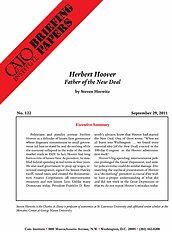Hoover’s big-spending, interventionist policies prolonged the Great Depression, and similar policies today could do similar damage. Dismantling the mythical presentation of Hoover as a “do-nothing” president is crucial if we wish to have a proper understanding of what did and did not work in the Great Depression so that we do not repeat Hoover’s mistakes today.
Herbert Hoover: Father of the New Deal
Politicians and pundits portray Herbert Hoover as a defender of laissez faire governance whose dogmatic commitment to small government led him to stand by and do nothing while the economy collapsed in the wake of the stock market crash in 1929. In fact, Hoover had long been a critic of laissez faire. As president, he doubled federal spending in real terms in four years. He also used government to prop up wages, restricted immigration, signed the Smoot-Hawley tariff, raised taxes, and created the Reconstruction Finance Corporation—all interventionist measures and not laissez faire. Unlike many Democrats today, President Franklin D. Roosevelt’s advisers knew that Hoover had started the New Deal. One of them wrote, “When we all burst into Washington … we found every essential idea [of the New Deal] enacted in the 100-day Congress in the Hoover administration itself.”
About the Author

This work is licensed under a Creative Commons Attribution-NonCommercial-ShareAlike 4.0 International License.
